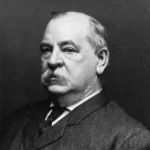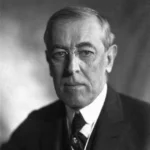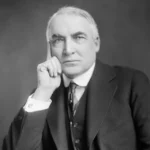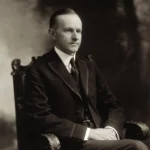Posted February 20, 2023
‘Who is president when Eugene O’Neill’s A Moon for the Misbegotten is set?’ seems a simple enough dramaturgical question to answer via a Google search. But first, we have to go back a couple of POTUSes to understand how politics and current events shaped the world of the play. Here’s a non-comprehensive look at the presidents leading up to the action of our play in 1923.
Grover Cleveland (1885–1889, 1893–1897)
 As a bit of a prologue to the more immediate timeline, let’s first jump back to the 19th century. During his second, non-consecutive term, President Cleveland signed the Bottled-in-Bond Act of 1897, requiring spirits like whiskey to be aged and bottled according to a set of legal regulations.
As a bit of a prologue to the more immediate timeline, let’s first jump back to the 19th century. During his second, non-consecutive term, President Cleveland signed the Bottled-in-Bond Act of 1897, requiring spirits like whiskey to be aged and bottled according to a set of legal regulations.
Read more about bottled-in-bond bourbon from Whiskey Fellow Ryan Negley.
Woodrow Wilson (1913–1921)
Wilson & Race
 When he arrived in Washington, D.C., in 1913, the federal government had been largely integrated since the early days of Reconstruction following the Civil War; Black Americans made up at least 10% of the federal workforce. As the first Southerner to occupy the White House, Wilson reversed decades of progress. He brought more segregation into Washington and halted Black advancement in government positions.
When he arrived in Washington, D.C., in 1913, the federal government had been largely integrated since the early days of Reconstruction following the Civil War; Black Americans made up at least 10% of the federal workforce. As the first Southerner to occupy the White House, Wilson reversed decades of progress. He brought more segregation into Washington and halted Black advancement in government positions.
In 1915, Wilson also held a private screening of the racist propaganda film, D.W. Griffith’s Birth of a Nation at the White House. The film rewrote history glorifying the Ku Klux Klan, and the KKK later saw a resurgence in the 1920s in every corner of the country. Even in New England, Black men like Jim Tyrone would have been threatened, harassed, beaten, and lynched by the Klan.
The Great War
Though he was narrowly re-elected in 1916 on the slogan “he kept us out of war,” Wilson asked Congress to declare war on Germany the following year.
The first world war had many consequences, but as European agricultural production was greatly halted, farmers like the Hogans expanded operations to meet global demand.
A global pandemic
In 1918, the Spanish Flu pandemic swept the globe, and an estimated 675,000 Americans perished from the virus. Wilson himself came down with a violent cough in April 1919 while at the height of negotiations at the Paris Peace Conference to end The Great War. His cognitive function was impaired, and he could not secure his key “14 Points” for world peace into the Treaty of Versailles. Wilson was permanently affected by the long-haul effects of the flu.
Back home, the treaty’s ratification was met with strong opposition from Irish Catholic Democrats as it failed to address the issue of Irish independence from British rule.
Later that year, in Pueblo, Colorado, he suffered a stroke while he was touring the country promoting the treaty and the U.S.’s joining of the League of Nations. The stroke left him incapacitated for the remainder of his life. Historians have come to understand that his wife, Edith Wilson, assumed many of the duties of the chief executive, effectively serving as de-facto president.
Prohibition, Recession, and Suffrage
By January of 1920, Prohibition began which banned the manufacturing, transportation, and sale of intoxicating liquors. But as we know from gangster movies and O’Neill plays, the law was hard to enforce. Bootlegging and speakeasies were rampant. The 18th Amendment was repealed 13 years later under FDR.
During this same time, the country fell into an economic depression as the world shifted from a wartime to a peacetime economy. As European agriculture rebounded following the war, American ag prices declined — even as the rest of the economy began to boom into the Roaring ’20s — and farmers grasped at government subsidies.
August of that year brought the national ratification of the 19th Amendment, granting white women like Josie Hogan the right to vote (the state of Connecticut ratified the amendment in 1919). However, it took many more years before Black, Latina, or Native American women could vote.
Warren G. Harding (1921–1923)
 In the first presidential election in which women could vote and the first since the end of The Great War, Warren Harding won in a landslide victory. The country’s post-war depression was ebbing, and Harding’s popularity grew.
In the first presidential election in which women could vote and the first since the end of The Great War, Warren Harding won in a landslide victory. The country’s post-war depression was ebbing, and Harding’s popularity grew.
Scandals
Harding suffered a heart attack in office and died in August of 1923. While he was eulogized as “an ideal American,” his many corruptions, scandals, affairs, gambling, and heavy drinking were revealed after his death. Members of his “Ohio Gang” of politicians and industry leaders were rumored to have sold confiscated bonded liquor to bootleggers. Harding even had a “blackmail fund” to pay off mistresses and bribe journalists.
Calvin Coolidge (1923–1929)
 Overnight, Calvin Coolidge became the 29th president of the United States.
Overnight, Calvin Coolidge became the 29th president of the United States.
He was inaugurated a few weeks before the action of Moon and likely had little impact on the Hogans at this point in their lives. However, he continually vetoed farm relief bills throughout his term in office.
“Well, farmers never have made money. I don’t believe we can do much about it. But of course we will have to seem to be doing something; do the best we can and without much hope. The life of the farmer has its compensations but it has always been one of hardship.” — President Calvin Coolidge
